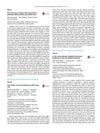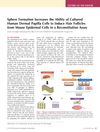 43 citations,
March 2009 in “Journal of Cellular and Molecular Medicine”
43 citations,
March 2009 in “Journal of Cellular and Molecular Medicine” TGF-β2 plays a key role in human hair growth and development.
11 citations,
September 2021 in “American Journal of Medical Genetics Part A” Four new cases of Bachmann-Bupp syndrome suggest potential for targeted treatment.
 September 2016 in “Journal of dermatological science”
September 2016 in “Journal of dermatological science” Adult skin cells can be used to create new hair in a lab.
 36 citations,
June 2018 in “Journal of The American Academy of Dermatology”
36 citations,
June 2018 in “Journal of The American Academy of Dermatology” Dermoscopy is useful for diagnosing various skin, hair, and nail disorders and can reduce the need for biopsies.
 5 citations,
June 2022 in “Frontiers in immunology”
5 citations,
June 2022 in “Frontiers in immunology” Increasing Treg cells in the skin does not cure hair loss from alopecia areata in mice.
 June 2024 in “Bőrgyógyászati és Venerológiai Szemle”
June 2024 in “Bőrgyógyászati és Venerológiai Szemle” New treatments for hair loss, like JAK inhibitors, PRP, anti-androgens, and minoxidil, offer better options.
 May 2020 in “Hair transplant forum international”
May 2020 in “Hair transplant forum international” The updated NPRT system now covers different types of hair loss in men and women.
 438 citations,
October 2010 in “Oncogene”
438 citations,
October 2010 in “Oncogene” Keratins help protect cells, aid in cancer diagnosis, and influence cancer behavior and treatment.
172 citations,
March 2019 in “The EMBO Journal” FERONIA and LRX proteins help control cell growth in plants by regulating vacuole expansion.
 75 citations,
August 2011 in “Journal of Investigative Dermatology”
75 citations,
August 2011 in “Journal of Investigative Dermatology” Forming spheres boosts the ability of certain human cells to create hair follicles when mixed with mouse skin cells.
71 citations,
January 2012 in “PloS one” The conclusion is that genetic differences affect how the cochlea heals after hair cell loss, which may challenge the creation of hearing loss treatments.
 63 citations,
September 2009 in “Regenerative Medicine”
63 citations,
September 2009 in “Regenerative Medicine” Scientists found a way to grow human hair cells in a lab that can create new hair when transplanted.
 13 citations,
January 2022 in “Stem cell reviews and reports”
13 citations,
January 2022 in “Stem cell reviews and reports” Mouse stem cells from hair follicles can improve wound healing and reduce scarring.
10 citations,
October 1981 in “Archives of Dermatology” The man's skin condition was finally identified as tinea incognito, a fungal infection.
6 citations,
February 2010 in “Biotechnology and bioprocess engineering” Using umbilical cord stem cells can help create hair-growing tissues more affordably.
3 citations,
December 2017 in “Clinical and Experimental Dermatology” Reversible hair loss in a ring pattern on the scalp may be linked to changes in leptin levels in fat tissue.
 3 citations,
June 2017 in “Journal of Biomaterials Applications”
3 citations,
June 2017 in “Journal of Biomaterials Applications” Keratin extract from human hair was found to promote hair growth in mice.
 2 citations,
August 2023 in “Autophagy”
2 citations,
August 2023 in “Autophagy” Autophagy helps control skin inflammation and cancer responses and regulates hair growth by affecting stem cell activity.
 1 citations,
February 2023 in “ACS Biomaterials Science & Engineering”
1 citations,
February 2023 in “ACS Biomaterials Science & Engineering” The new microwell device helps grow more hair stem cells that can regenerate hair.
 March 2023 in “Translational Andrology and Urology”
March 2023 in “Translational Andrology and Urology” 5-alpha reductase inhibitors, like finasteride and dutasteride, are used for prostate issues, hair loss, and excessive hair growth, may help with COVID-19, but can cause sexual and mental health side effects, and their use in preventing prostate cancer needs more examination.
 February 2023 in “World journal of plastic surgery”
February 2023 in “World journal of plastic surgery” Platelet-rich plasma is now used in plastic surgery.
March 2021 in “Cell stem cell” Skin cell behavior is influenced by the tightness of nearby cells, affecting their growth and development.
 August 2020 in “Revista de chimie”
August 2020 in “Revista de chimie” Nitroglycerin ointment is now used to treat several skin conditions with fewer side effects.
April 2018 in “The journal of investigative dermatology/Journal of investigative dermatology” Certain immune cells, when activated by specific signals, can encourage hair growth.
April 2010 in “The journal of immunology/The Journal of immunology” FoxN1 gene is crucial for proper thymus structure and normal skin appearance.
 336 citations,
August 2015 in “European Journal of Epidemiology”
336 citations,
August 2015 in “European Journal of Epidemiology” The Rotterdam Study found risk factors for elderly diseases, links between lifestyle and genetics with health conditions, and aimed to explore new areas like DNA methylation and sensory input effects on brain function.
 266 citations,
November 2013 in “European Journal of Epidemiology”
266 citations,
November 2013 in “European Journal of Epidemiology” The Rotterdam Study aims to understand disease causes in the elderly and has found new risk factors and genetic influences on various conditions.
 207 citations,
January 2011 in “Dermatologic Therapy”
207 citations,
January 2011 in “Dermatologic Therapy” Laser hair removal is the most requested cosmetic procedure and has become a scientifically-based treatment suitable for all skin types.
190 citations,
July 2006 in “Experimental Dermatology” The hedgehog signalling pathway is key in skin development and basal cell carcinoma, offering insights for prevention and treatment.
 150 citations,
January 2018 in “Burns & Trauma”
150 citations,
January 2018 in “Burns & Trauma” Bioprinting could improve wound healing but needs more development to match real skin.




















